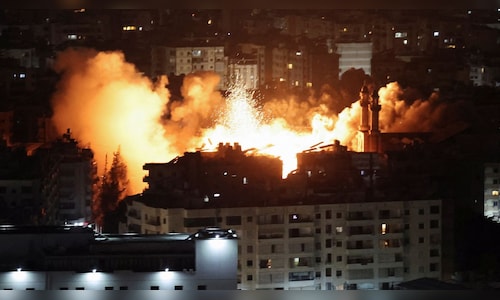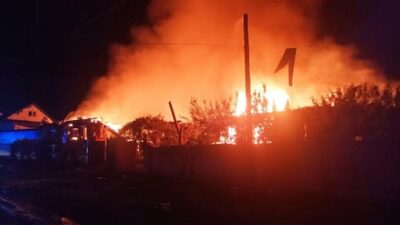At least 10 strikes struck the southern suburbs of Beirut, a vast area known as Dahiyeh, starting around 90 minutes after the Israeli military issued evacuation alerts for four locations in the vicinity.
This marked the fourth time Dahiyeh had been bombed since a U.S.-brokered ceasefire in November ended a year-long conflict between Israel and the Iran-backed Lebanese group Hezbollah. The ceasefire stipulates that Hezbollah must withdraw all military assets and fighters from southern Lebanon and mandates the disarmament of all non-state militant factions throughout the country.
On June 5, the Israeli military stated its intention to target “underground UAV production facilities that were intentionally set up within civilian neighborhoods” in Dahiyeh. They claimed Hezbollah was manufacturing thousands of drones there, “with direction and funding from Iranian terrorists.”
Read more: Israel recovers bodies of 2 Israeli-American hostages from Gaza Strip
No immediate response came from Hezbollah, which has previously denied allegations of situating military sites within civilian areas. A Lebanese security source informed Reuters that earlier on June 5, the Lebanese army had received a notice about military equipment being stored in a certain area of Dahiyeh. Upon inspection, the army concluded that no military equipment was present.
“Then, the Israeli military issued their warning. The army attempted to re-enter Dahiyeh to conduct further searches and avert the strikes, but Israeli warning shots prevented the troops from entering the area,” the source noted. The air strikes resulted in heavy smoke filling the skyline of the district until midnight, as documented in Reuters footage. Thousands of people evacuated, causing severe traffic congestion. Many fled on foot to stay with relatives, while others chose to remain on the streets.
Israeli strikes also affected the southern Lebanese village of Ain Qana, as reported by Lebanese state media, shortly after evacuation alerts for the area were disseminated. The attacks coincided with the impending start of the Muslim holiday Eid Al-Adha on Thursday (June 5). The strikes “caused renewed panic and fear on the eve of Eid Al-Adha,” according to the Office of the United Nations Special Coordinator for Lebanon on X.
Lebanese President Joseph Aoun and Prime Minister Nawaf Salam both denounced the strikes as a “blatant violation” of international accords. Hezbollah and Israel have accused one another of failing to abide by the terms of the truce, which has appeared increasingly unstable in recent months.
Read more: Russia attacks Kyiv with drones and missiles, killing Four
Israel’s military has consistently targeted southern Lebanon, and Israeli forces continue to occupy five strategic hilltop positions in the southern region. Since the ceasefire was enacted, Israel has struck Beirut’s suburbs three times, primarily in retaliation for rocket fire from Lebanon. Hezbollah has denied any involvement in those incidents.
The latest conflict between Israel and Hezbollah erupted in October 2023, when Hezbollah launched rockets at Israeli military installations in support of its Palestinian ally Hamas.
Israel escalated the situation the following year through a significant bombing campaign that resulted in thousands of Hezbollah fatalities and significant destruction of its arsenal, including the elimination of its top leadership, such as then-secretary general Hassan Nasrallah.



